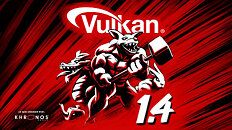- Joined
- Oct 9, 2007
- Messages
- 47,596 (7.45/day)
- Location
- Dublin, Ireland
| System Name | RBMK-1000 |
|---|---|
| Processor | AMD Ryzen 7 5700G |
| Motherboard | Gigabyte B550 AORUS Elite V2 |
| Cooling | DeepCool Gammax L240 V2 |
| Memory | 2x 16GB DDR4-3200 |
| Video Card(s) | Galax RTX 4070 Ti EX |
| Storage | Samsung 990 1TB |
| Display(s) | BenQ 1440p 60 Hz 27-inch |
| Case | Corsair Carbide 100R |
| Audio Device(s) | ASUS SupremeFX S1220A |
| Power Supply | Cooler Master MWE Gold 650W |
| Mouse | ASUS ROG Strix Impact |
| Keyboard | Gamdias Hermes E2 |
| Software | Windows 11 Pro |
Today, the Khronos Group, an open consortium of industry-leading companies dedicated to creating advanced interoperability standards, has announced the release of Vulkan 1.4, the latest version of its cross-platform 3D graphics and compute API. Vulkan 1.4 integrates and mandates support for many proven features into its core specification, expanding the functionality that is consistently available to developers, greatly simplifying application development and deployment across multiple platforms.
"Vulkan 1.4 is a developer-driven update that enhances Vulkan's value as a stable, reliable framework for creating graphics-intensive applications on any platform," said Tom Olson, outgoing Vulkan Working Group Chair. "As I step down, I'm proud to see the groundwork we've laid through our roadmaps come to fruition. Our roadmap milestone plans have empowered developers with new levels of flexibility and performance, setting Vulkan on a path for continued innovation and broader adoption in the years to come."

The Vulkan 1.4 specification consolidates numerous previously optional extensions, features, and increased minimum hardware limits, many of which were defined in the Vulkan Roadmap 2022 and 2024 milestones and associated profiles, including:
The Vulkan Conformance Test Suite (CTS) is an extensive set of close to three million tests in open source that all Vulkan implementers must pass, increasing cross-platform consistency. AMD, Arm, Imagination, Intel, NVIDIA, Qualcomm, and Samsung all have development drivers that have passed Vulkan 1.4 Conformance. Additionally, Mesa open-source Linux drivers have passed Vulkan 1.4 conformance on AMD, Apple, Intel, NVIDIA, and Qualcomm hardware. Production drivers that have passed Khronos's formal conformance testing process are listed on the Vulkan Conformant Products register.
Vulkan's tooling ecosystem continues to grow, providing developers with powerful, community-driven tools that improve shader portability and performance. The Vulkan SDK from LunarG supports multiple shader languages, including HLSL, GLSL, and Slang—now a Khronos-hosted open-source project—enabling developers to use the shading language that best suits their technical and commercial requirements. The Vulkan SDK will be updated to include support for version 1.4 in January 2025.
View at TechPowerUp Main Site
"Vulkan 1.4 is a developer-driven update that enhances Vulkan's value as a stable, reliable framework for creating graphics-intensive applications on any platform," said Tom Olson, outgoing Vulkan Working Group Chair. "As I step down, I'm proud to see the groundwork we've laid through our roadmaps come to fruition. Our roadmap milestone plans have empowered developers with new levels of flexibility and performance, setting Vulkan on a path for continued innovation and broader adoption in the years to come."

The Vulkan 1.4 specification consolidates numerous previously optional extensions, features, and increased minimum hardware limits, many of which were defined in the Vulkan Roadmap 2022 and 2024 milestones and associated profiles, including:
- Streaming Transfers: Vulkan 1.4 imposes new implementation requirements to ensure portable, cross-platform applications can stream large quantities of data to a device while simultaneously rendering at full performance.
- Previously optional extensions and features critical to emerging high-performance applications are now mandatory in Vulkan 1.4, ensuring their reliable availability across multiple platforms. These include push descriptors, dynamic rendering local reads, and scalar block layouts.
- Maintenance extensions up to and including VK_KHR_maintenance6 are now part of the core Vulkan 1.4 specification.
- 8K rendering with up to eight separate render targets is now guaranteed to be supported, along with several other limit increases.
The Vulkan Conformance Test Suite (CTS) is an extensive set of close to three million tests in open source that all Vulkan implementers must pass, increasing cross-platform consistency. AMD, Arm, Imagination, Intel, NVIDIA, Qualcomm, and Samsung all have development drivers that have passed Vulkan 1.4 Conformance. Additionally, Mesa open-source Linux drivers have passed Vulkan 1.4 conformance on AMD, Apple, Intel, NVIDIA, and Qualcomm hardware. Production drivers that have passed Khronos's formal conformance testing process are listed on the Vulkan Conformant Products register.
Vulkan's tooling ecosystem continues to grow, providing developers with powerful, community-driven tools that improve shader portability and performance. The Vulkan SDK from LunarG supports multiple shader languages, including HLSL, GLSL, and Slang—now a Khronos-hosted open-source project—enabling developers to use the shading language that best suits their technical and commercial requirements. The Vulkan SDK will be updated to include support for version 1.4 in January 2025.
View at TechPowerUp Main Site








